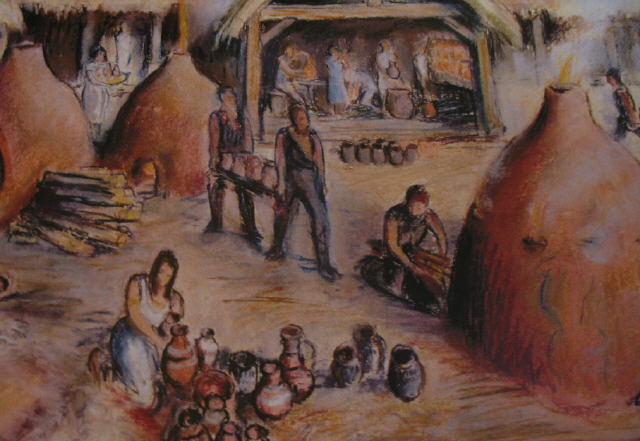|
Religion and
mythology played the great role for Celts, unlike the neighbouring Roman
Empire where the social pyramid was held up on the army devoted to the
emperor. Those who kept and embodied mythology were druids (or priests).
In spite of
the fact that the Celts had a propensity to monotheism, it is known that
they had a lot of different deities with various functions.
Unfortunately, it is not much known about Celtic gods, as well as about many
other things from the life of Celts. Antique sources give us little
information and another source is the Irish sagas which were written down
already during Christian times. In these sagas gods act as heroes. The
reconstruction of Celtic pagan pantheon is possible with the help of the
Scandinavian sources, but it demands special research which is beyond the
given work.
Nevertheless
the witness of Julius Caesar will be given. In the sixth book of ōNotes
about Gallic warö there is such description of druids: ōDruids take an
active part in affairs of worship, watch the correctness of public
sacrifices, and construe all the questions concerning religion; a lot of
youth is sent to them for studying sciences and in general druids are
respected by Gauls (i.e. Celts). It were druids who passed sentences on all
disputable issues, both public and private..and if somebody, whether a
private individual or the whole nation does not obey their will, they will
be deprived of the sacrifices. It is the most severe punishment for them.
Those who were deprived in that way were considered ungodly and the
criminal, everybody shuns them like from an infectious, avoids meetings and
conversations with them not to get in the trouble.ö
Most likely,
druidism originated from Britain. So Caesar supposed. Also the texts of
Irish sagas prove it. The schools of secret knowledge that were situated on
the territory of modern Scotland (in Alban) are mentioned there.
The religion
played the great role in the public life of Celts. Sometimes reaching
mysticism, it strongly held the consciousness of all believers and made them
flexible material in the hands of ruling groups. The religion gave way to
various cults, rites, customs, traditions, myths and epos.

The
fundamentals about god can be found in the triads of Irish bards. There the
main points of Celtic world-outlook concerning various questions are
postulated. There are triads about the Man and his ordinariness, about
essences in general and, certainly, about god.
By Julius
CaesarÆs description, the Gauls had their gods, which corresponded to five
functions and presented by Mercury, Jupiter, Mars, Apollo and the Minerva in
Roman mythology. Unfortunately, he gave no local name of these deities.
After the
conquest of Gallia and its Romanization the process of merging of Celtic and
Roman pantheons started, and it had the deliberate character.
The Gauls
chose the Roman names for their gods by the principle of correspondence of
iconography and functions (in the same way as the pagans throughout Europe
identified mythological characters with Christian sacred centuries later).
To CaesarÆs credit be it said that he managed to single out the main
mythological types that were later revered by Gaul-Romans under the Roman
names. Of course, he missed something. Besides, the direct identification
emasculates some interesting features of Celtic mythology.
So, speaking
about Old Celtic (Gallic and, in a lesser degree, Briton) deities, usually
the following names are mentioned: Taranis, Cernunnos, Esus (Hesus),
Toutatis (Teutates), Lugh, Belenus, Ogmios, Brigantia.
|

